| |||||
| Decades: | |||||
|---|---|---|---|---|---|
| See also: | |||||
Events from the year 1998 in Pakistan.
| |||||
| Decades: | |||||
|---|---|---|---|---|---|
| See also: | |||||
Events from the year 1998 in Pakistan.
Sultan Bashiruddin Mahmood is a Pakistani nuclear engineer, a scholar of Islamic studies and pseudoscientist. He was the subject of a criminal investigation launched by the Federal Investigation Agency (FIA) over unauthorized travel in Afghanistan prior to the September 11 attacks in 2001.
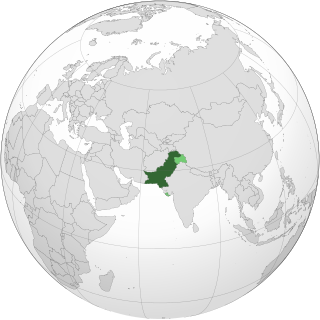
Pakistan is one of nine states that possess nuclear weapons. Pakistan began developing nuclear weapons in January 1972 under Prime Minister Zulfikar Ali Bhutto, who delegated the program to the Chairman of the Pakistan Atomic Energy Commission (PAEC) Munir Ahmad Khan with a commitment to having the device ready by the end of 1976. Since PAEC, which consisted of over twenty laboratories and projects under reactor physicist Munir Ahmad Khan, was falling behind schedule and having considerable difficulty producing fissile material, Abdul Qadeer Khan, a metallurgist working on centrifuge enrichment for Urenco, joined the program at the behest of the Bhutto administration by the end of 1974. As pointed out by Houston Wood, "The most difficult step in building a nuclear weapon is the production of fissile material"; as such, this work in producing fissile material as head of the Kahuta Project was pivotal to Pakistan developing the capability to detonate a nuclear weapon by the end of 1984.
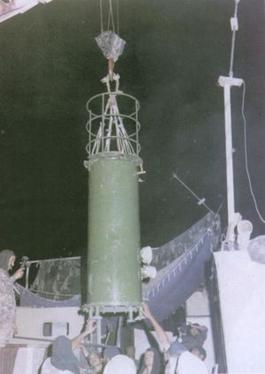
The Pokhran-II tests were a series of five nuclear bomb test explosions conducted by India at the Indian Army's Pokhran Test Range in May 1998. It was the second instance of nuclear testing conducted by India; the first test, code-named Smiling Buddha, was conducted in May 1974.

Pakistan Atomic Energy Commission (PAEC) is a federally funded independent governmental agency, concerned with research and development of nuclear power, promotion of nuclear science, energy conservation and the peaceful usage of nuclear technology.
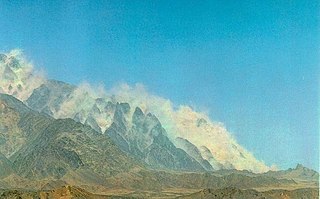
Chagai-I is the code name of five simultaneous underground nuclear tests conducted by Pakistan at 15:15 hrs PKT on 28 May 1998. The tests were performed at Ras Koh Hills in the Chagai District of Balochistan Province.

Dr. Samar Mubarakmand is a Pakistani nuclear physicist known for his research in gamma spectroscopy and experimental development of the linear accelerator.

Ishfaq Ahmad KhanSI, HI, NI, FPAS, was a Pakistani nuclear physicist, emeritus professor of high-energy physics at the National Centre for Physics, and former science advisor to the Government of Pakistan.
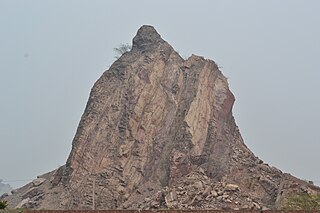
The Kirana Hills is a small and extensive rocky mountain range located in Rabwah and Sargodha, Pakistan. It is also a place of tourist attraction in Sargodha City. Locally known as "Black Mountains" due to its brownish landscape, its highest peak is about 980 feet (300 m).

Muhammad Raziuddin Siddiqui was a Pakistani theoretical physicist and mathematician.
The political history of Pakistan is the narrative and analysis of political events, ideas, movements, and leaders of Pakistan. Pakistan gained independence from the United Kingdom on 14 August 1947, when the Presidencies and provinces of British India were divided by the United Kingdom, in a region which is commonly referred to as the Indian subcontinent. Since its independence, Pakistan has had a colorful yet turbulent political history at times, often characterized by martial law and inefficient leadership.
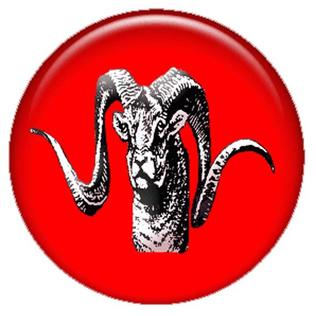
The Frontier Works Organization ); abbreviated as FWO), is a military engineering organization, and one of the major science and technology commands of the Pakistan Army. Commissioned and established in 1966, the FWO includes active duty officers and civilian scientists and engineers. Since its establishment in 1966, it has been credited with the construction of bridges, roads, tunnels, airfields and dams in Pakistan, on the orders of the civilian government of Pakistan.
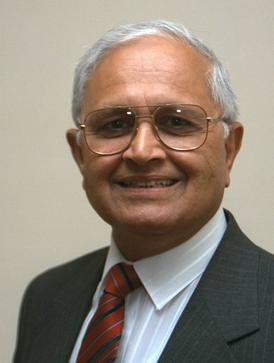
Munir Ahmad Khan, NI, HI, FPAS, was a Pakistani nuclear reactor physicist who is credited, among others, with being the "father of the atomic bomb program" of Pakistan for their leading role in developing their nation's nuclear weapons during the successive years after the war with India in 1971.

Ishrat Hussain Usmani NI, best known as I. H. Usmani, was a Pakistani atomic physicist, and later a public official who chaired the Pakistan Atomic Energy Commission (PAEC) from 1960 to 1971 as well as overseeing the establishment of the Space Research Commission.
Muhammad Masud Ahmad, best known as Masood Ahmad, was a Pakistani theoretical physicist and ICTP laureate known for his work in dual resonance and Veneziano model, a strings sting mathematically described the fundamental forces and forms of matter in quantum state.
Muhammad Hafeez Qureshi, SI, HI, known as Hafeez Qureshi, was a Pakistani nuclear scientist and a mechanical engineer, known for his classified work at WGS at the Pakistan Atomic Energy Commission (PAEC).
Anwar Ali, is a Pakistani physicist and a computer programmer, who served as the Chairman of the Pakistan Atomic Energy Commission (PAEC) from 2006 until 2009. His scientific career is spent at the Pakistan Atomic Energy Commission as a computational physicist and played a key scientific role his nation's secret nuclear deterrent program.
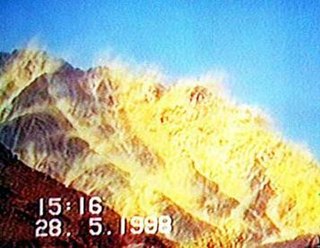
Project-706, also known as Project-786 was the codename of a research and development program to develop Pakistan's first nuclear weapons. The program was initiated by Prime Minister Zulfiqar Ali Bhutto in 1974 in response to the Indian nuclear tests conducted in May 1974. During the course of this program, Pakistani nuclear scientists and engineers developed the requisite nuclear infrastructure and gained expertise in the extraction, refining, processing and handling of fissile material with the ultimate goal of designing a nuclear device. These objectives were achieved by the early 1980s with the first successful cold test of a Pakistani nuclear device in 1983. The two institutions responsible for the execution of the program were the Pakistan Atomic Energy Commission and the Kahuta Research Laboratories, led by Munir Ahmed Khan and Abdul Qadeer Khan respectively. In 1976 an organization called Special Development Works (SDW) was created within the Pakistan Army, directly under the Chief of the Army Staff (Pakistan) (COAS). This organization worked closely with PAEC and KRL to secretly prepare the nuclear test sites in Baluchistan and other required civil infrastructure.

The Pakistan Atomic Research Reactor or (PARR) are two nuclear research reactors and two other experimental neutron sources located in the PINSTECH Laboratory, Nilore, Islamabad, Pakistan.
Chagai-II is the codename assigned to the second atomic test conducted by Pakistan, carried out on 30 May 1998 in the Kharan Desert in Balochistan Province of Pakistan. Chagai-II took place two days after Pakistan's first successful test, Chagai-I, which was carried out on 28 May 1998 in the Ras Koh area in Chagai District, Balochistan, Pakistan.